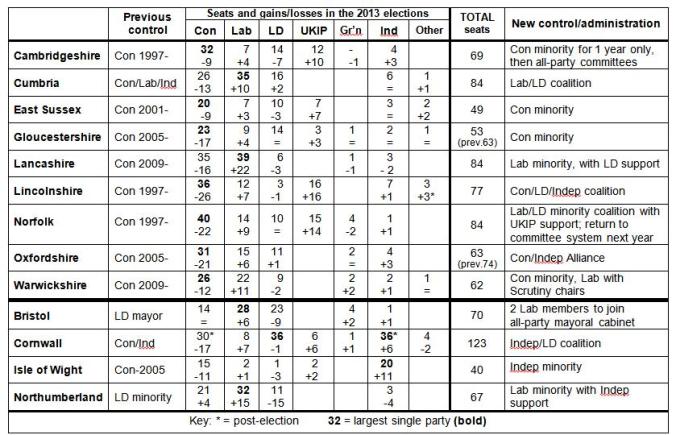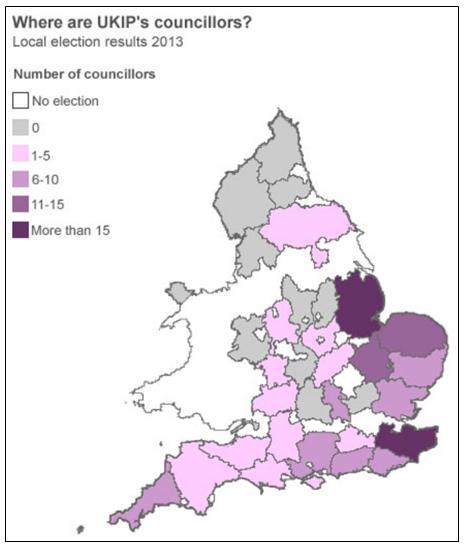Councillor Paul Millar
Analysis by local government academic Chris Game shows that there were a total of 45 District Councils where no one political party/grouping could command a majority after the 2019 local elections. In the majority of these cases where the result was ‘No Overall Control’, rainbow coalitions were formed. East Devon provided a rare exception to this rule, and this article explores the struggles of running a minority administrations under a Leader-Cabinet system.
In May 2019, the political composition of East Devon District Council changed. The Conservatives had controlled the Council with a comfortable majority for over four decades. When the Council was created in 1972, the Council was independent-run. Back then, there was a utopian vision of being a non-political Council. Though this convention remains at some town and parish Councils in the area, such as Sidmouth, it didn’t last for long at East Devon District. At the 1976 election, the majority of the Independents successfully ran as Conservatives and, the Council remained Conservative for the following 43 years.
Local elections in 2019 saw gains for independents across the country. East Devon was however a particular success story, with Independent candidates elected in all 31 seats they ran in – a 100% success rate. Most independents in East Devon campaigned on local issues, championing attention for their Wards. When I knocked on doors, while there were a few residents who wanted to rebel against the Conservatives because of the Brexit limbo in Parliament, many more expressed the sentiment that it was time for a change locally, with a general feeling that the East Devon Conservative Group had become complacent in office.
Despite these gains, it quickly became clear that some independent Councillors were too independent and unwilling to work together. A common vision of the strategic running of the Council could not be united around. Broadly, the 31 Independent Councillors were split into three distinct camps. The first comprised of broadly anti-development, anti-austerity Independents who believed the Council’s sole job was to deliver universal and high-quality public services. Many of these indepedents united around the ‘East Devon Alliance’ brand. This camp felt the Council had been let down by the Conservatives, and that inappropriate development schemes had been forced through at the expense of local living standards. This camp also believed that a stronger case made for the Council receiving greater financial support from government to deliver decent public services.
The second camp was mainly made up of broadly pro-development, neo-liberal minded independents who fully embraced the idea of the Council being run as a self-sufficient business, embracing high-risk borrowing for commercial investment, while happy to reduce and narrow the provision of public services which lose the Council money. This camp unsurprisingly contained independents who had previously represented the Conservatives. In my view, often they seemed to know the price of everything, and the value of nothing. In the third camp sat independents who were yet to find their political identities and had not been heavily involved in previous local debates. I was somewhere between the first and third camps.
Before 1998, Members were able to run as Independent Conservative, but the Registration of Political Parties Act specifies that political candidates who are not members of the Conservative Party but are otherwise identify with their policies and are wedded to their values, can no run under such a label. In East Devon, a few Conservatives had become Independents due to being unable to fulfil their ambitions within the local party, or personal or policy clashes within their local party associations, sometimes over local matters.
Councillor Ben Ingham was elected Leader of the Council last May and decided to run the Council as a minority of 20 Independents, cutting off 11 whose views he considered were “too left-wing” out of the administration. I, having only recently resigned my membership of the Labour Party as the party had become unmanageable under Jeremy Corbyn, accepted a position in Cllr Ingham’s Cabinet. A Conservative Chairman was elected, and generous offers of positions were made, which made me feel a tad uncomfortable. I recall being reassured at the time that the Chairman of the Council was not a political role. Later, his office became political as the Chair voted against an Annual meeting to have his position elected.
Slowly, it became clear that an overly cosy relationship with the Conservative Group which the electorate had just voted out, had been forged. My election leaflet promised change. After raising concerns with the business-as-usual approach, I was sacked from the Cabinet and I decided to quit the ruling Independent Group and sit as an unaffiliated independent.
Cllr Ingham has a long experience as a Councillor dating back to 1995, the first ten years as a Councillor as a Conservative. He left the party after launching a leadership bid and ‘No Confidence’ vote against the Leader of the East Devon District Council Conservative Group at the time, Sara Randall-Johnson.
Running a minority Council under a Cabinet system is as unideal as it gets. Constitutional amendments and two Scrutiny Call-Ins on two key issues prevented the Cabinet from administering key policies to significantly increase car parking charges and complete a deeply unpopular and long-running regeneration project in one of its seaside towns. Under a Committee system, some consensus might have been found. By January of this year, the Independent Group lost another Member due to a Cabinet decision not to invest in saving a community hospital despite officer recommendations, East Devon District Council had the smallest number of Councillors in a ruling administration of any Council in the country, well under a third of the membership.
By March, the ruling group could not get any major policy approved by the membership and had started to fight among themselves. One Cabinet meeting descended into a row as the Leader appeared to lose trust in even his closest colleagues. Some independents, the Liberal Democrats and Greens came together in a rainbow alliance and formed a majority new administration last month, while the former Leader has returned to his spiritual home of theConservative Group.
With true colours having finally been shown, the new administration has the immediate task of crisis response. When the crisis ends, the new administration will plan to implement ambitious policies to increase democracy, transparency as well as prioritising climate change, poverty and the economic recovery from COVID-19, which is reflected in a new Cabinet and three new positions.
Councillor Paul Millar is an Independent Councillor at East Devon District Council, Portfolio Holder for Democracy & Transparency, who now sits in the Democratic Alliance coalition.


